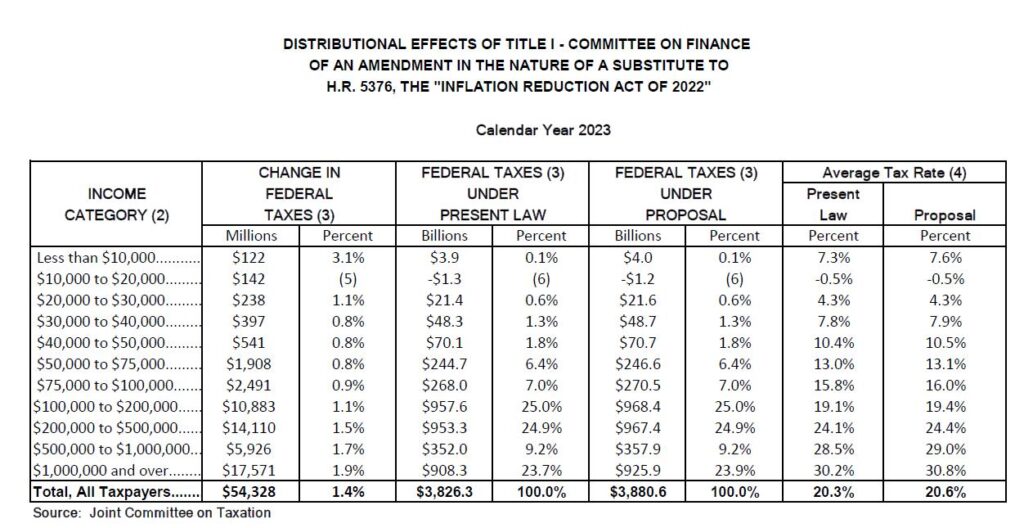How the Left Is Trying to Redefine the Words “Tax Increase”
After years spent trying to redefine the word “sex,” the Biden administration and a sycophantic media recently tried to redefine the term “recession” to suit Democrats’ political purposes.
Now, Democrats want to redefine the word “tax,” as they attempt to explain away the fact that their tax-and-spend extravaganza won’t only hit “the rich,” but will hammer middle class families. The American people shouldn’t buy it—or any other Orwellian (or, if you prefer, Clintonian) attempt to redefine simple words and concepts.
Non-Partisan Experts: Get Ready to Pay More Taxes
The debate comes as Congress’ nonpartisan arbiter, the Joint Committee on Taxation, released a report on the tax-and-spend measure the Senate passed Sunday, paving the way for House Democrats’ majority and Biden to pass it into law. The analysis found that Americans in all income brackets will see an increase in their federal taxes next year, once the bill’s provisions take effect. Look at the column entitled “Change in Federal Taxes,” with the results broken out by income bracket:

As the table makes clear, middle-class families with household incomes below $200,000 will see their taxes increase by more than $16.7 billion next year alone. When considering that households earning between $200,000 and $500,000 will pay another $14.1 billion in taxes, roughly half of the $54.3 billion in new taxes assessed under the bill will be paid by families earning less than $400,000 per year—whose taxes Biden pledged not to raise.
Working Folks Pay for Taxing ‘Rich Companies’
Marc Goldwein, of the Committee for a Responsible Federal Budget, explained to Bloomberg the reasoning behind the JCT analysis. While the Democrat tax-and-spend bill would raise corporate taxes, “ultimately, ‘people pay taxes.’”
JCT, like most economic modelers, assumes that those corporate taxes will get passed on to individuals, whether in the form of lower wages or higher prices. Of course, those developments come at a time inflation continues to eat away at family budgets, and real (i.e., inflation-adjusted) earnings continue to decline.
In other words, at a time families find it harder and harder to pay their bills every month, the Democrat bill would impose even more pain on working families, giving them an(other) effective pay cut.
Government Picking Winners and Losers
Goldwein continued with an argument Democrats have made in an attempt to deflect criticism about these tax increases: “Once you account for the spending side and the other taxes that are left out—and that includes the household consumer tax credits for various energy things, lower drug prices, and health care subsidies—the middle class is going to be distributionally ahead.”
That argument doesn’t hold water, for several reasons. First, nearly three-quarters (73.1 percent) of the Obamacare subsidy spending doesn’t come in the form of lower revenues, but outlay spending. In other words, those subsidy payments aren’t tax cuts for people who pay income taxes, but welfare spending over and above any income tax obligations those particular households would face.
More importantly, however, this type of argument shows a fundamental dishonesty. Biden didn’t claim during the 2020 campaign that “Middle class families will pay more in taxes—but they’ll get more back in benefits.” He pledged “no new taxes” for families with incomes under $400,000.
For Biden and the left to now try to redefine their promise doesn’t just represent a campaign pledge broken. It’s an attempt to justify yet another attempt by government to pick winners and losers—lawmakers and bureaucrats bestowing favors on politically connected individuals, or those who engage in behaviors Democrats approve of (i.e., “household consumer tax credits for various energy things.”)
Echoes of Obamacare Debate
We’ve seen this all before. In 2009, Barack Obama tried to claim that Obamacare’s individual mandate—which assessed financial penalties on Americans who couldn’t afford to buy health insurance—did not constitute a tax increase.
But George Stephanopoulos, of all people, called him on it, quoting the dictionary definition of “tax” to Obama as entirely consistent with the mandate: “A charge, usually of money, imposed by authority on persons or property, for public purposes.”
All Obama could do in reply was snicker, claiming that “the fact that you looked up Merriam’s dictionary, the definition of tax increase, indicates to me that you’re stretching a little bit right now.”
It speaks volumes about the popularity (or lack thereof) of their policies that Democrats continually feel the need to misrepresent their legislative proposals. But ultimately, the American people will recognize the impact in their wallets of raising taxes during a recession—and remember at the ballot box, both in November, and in years to come.
This post was originally published at The Federalist.